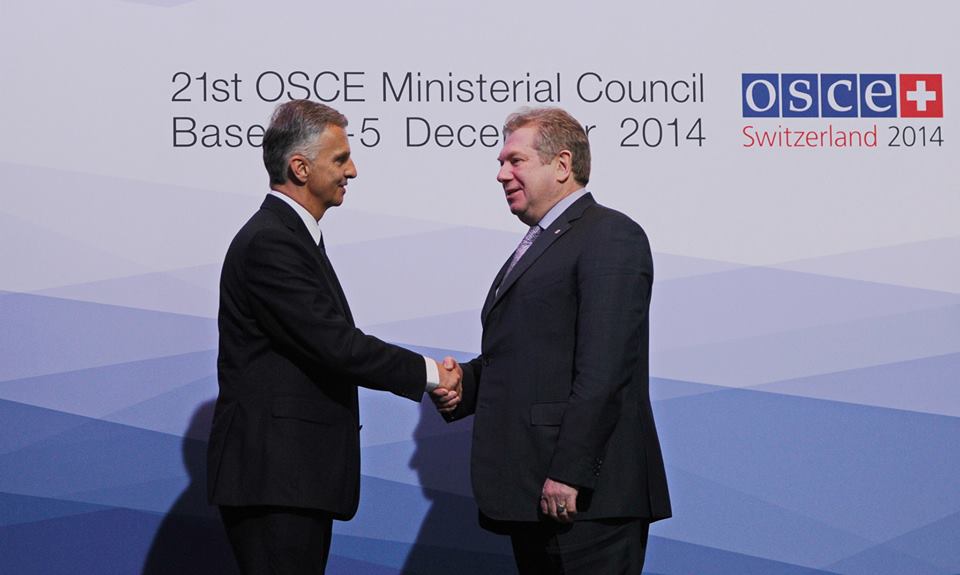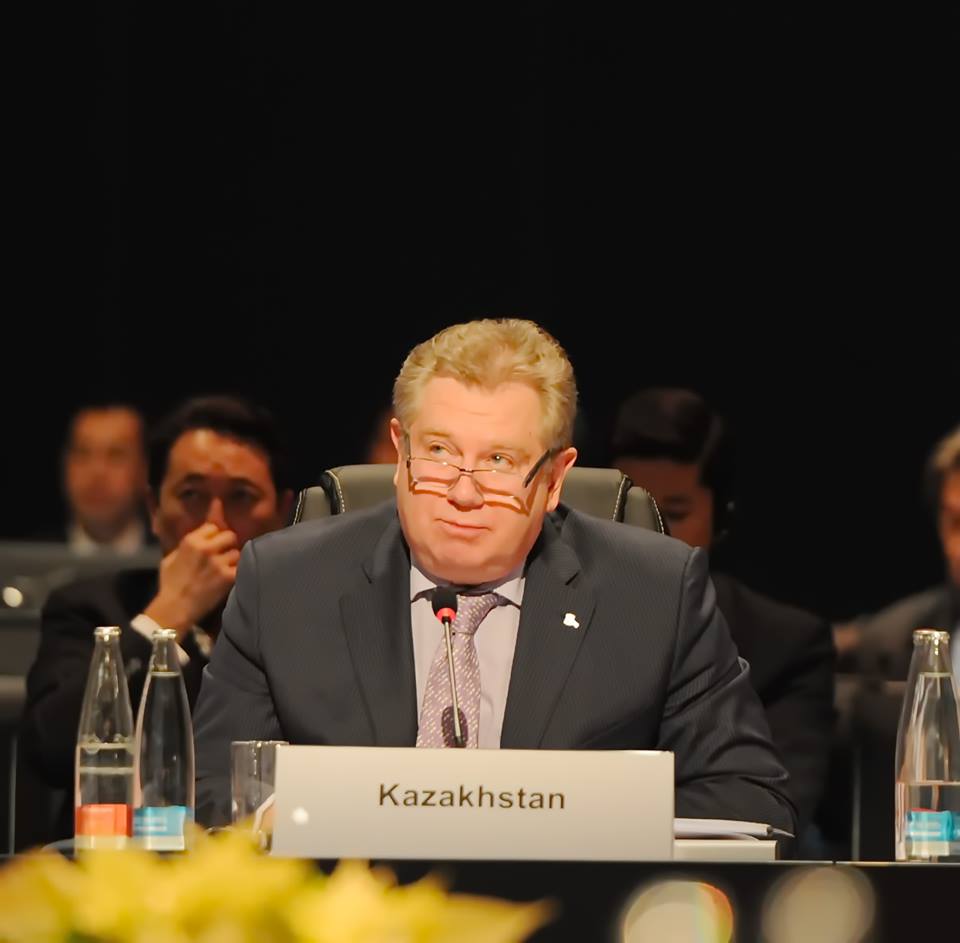Foreign ministers from Organisation for Security and Cooperation in Europe (OSCE) participating states assembled in Basel on Dec. 4-5 for the annual Ministerial Council meeting to assess progress and make decisions on new commitments to ensure political, military, economic, environmental and human security.

Alexey Volkov (r), Kazakhstan’s deputy foreign minister, urged the soonest end to conflict in Ukraine and to mutual sanctions between Russia and the West over that conflict in his remarks at the Dec. 4-5 OSCE Ministerial Council in Basel, Switzerland.
Around 1,200 delegation members from 57 OSCE participating states, including numerous foreign ministers and around 200 media representatives attended the event at the invitation of the 2014 OSCE Chairperson-in-Office, Swiss Foreign Minister Didier Burkhalter.
“During our chairmanship year, there have been serious challenges to security in the OSCE area,” Burkhalter said in his welcoming speech in an apparent reference to the Ukrainian crisis. “While our organisation once again has proven to be useful in building bridges and responding operationally to crises, further efforts will be required to enhance security and cooperation in the Euro-Atlantic and Eurasia regions.”
It was at the Astana summit of the OSCE in December 2010 that the OSCE heads of state and government approved the declaration in which they recommitted themselves “to the vision of a free, democratic, common and indivisible Euro-Atlantic and Eurasian security community stretching from Vancouver to Vladivostok, rooted in agreed principles, shared commitments and common goals.”
“Switzerland will remain committed to strengthening the OSCE and promoting cooperative security beyond its chairmanship year. A strong OSCE strengthens peace, stability and security for everyone living in the OSCE region. Twenty-five years after the fall of the Berlin Wall, it’s our responsibility to ensure that Europe is not divided again,” he added.
The two-day council occurs near the end of every year and in the final stage of each chairmanship. It acts as the central decision-making and governing body in the period between OSCE summits and provides a rare opportunity for participating states and their 11 partner nations to engage in high-level multilateral and bilateral talks on their current security relations and concerns.
Around 20 draft declarations were debated at the council this year and a discussion focusing on OSCE action in response to the crisis in Ukraine as well as common challenges within and beyond the OSCE area was held.
In his remarks at the meeting, Alexey Volkov, Kazakhstan’s deputy foreign minister, noted that today, despite significant efforts to find common ground, the crisis in Ukraine continues to pose a grave challenge, not just to the OSCE, but to the entire international community.
“For Kazakhstan, relations with Ukraine have always occupied a special place. We are connected by a common history and close economic and cultural ties. The Ukrainian diaspora is one of the largest in Kazakhstan, numbering more than 330,000. For all of these reasons, Kazakhstan wants to see Ukraine remain a sovereign, stable and independent state,” Volkov said.
 “From the outset of the crisis, Kazakhstan’s President, Nursultan Nazarbayev, has made efforts to stabilise the situation. Our country continues to believe a solution will come only through peaceful dialogue and constructive mediation. We applaud Switzerland’s intentions to continue to mediate and seek a resolution to the Ukrainian crisis after the end of its OSCE chairmanship and its support for the creation of the Panel of Eminent Persons on European Security,” he added.
“From the outset of the crisis, Kazakhstan’s President, Nursultan Nazarbayev, has made efforts to stabilise the situation. Our country continues to believe a solution will come only through peaceful dialogue and constructive mediation. We applaud Switzerland’s intentions to continue to mediate and seek a resolution to the Ukrainian crisis after the end of its OSCE chairmanship and its support for the creation of the Panel of Eminent Persons on European Security,” he added.
Volkov stated one potential channel to re-establish and rebuild the relationship is the proposed launch of a dialogue between the European Union and the Eurasian Economic Union. Kazakhstan wishes to see Europe and Asia come together as a single space and market, which would greatly enhance our shared objective of building a common Euro-Atlantic and Eurasian security community, he said.
According to Kazakhstan’s deputy foreign minister, closer ties between Europe and Eurasia are already becoming a reality. Just a few months ago, Kazakhstan and the EU completed negotiations on a new enhanced partnership and cooperation agreement, which provides a firm basis for full-scale strategic cooperation..
German Federal Minister for Foreign Affairs Frank-Walter Steinmeier noted during the meeting that the OSCE is not an organisation of the past, but a pillar of European security.
The Council set the course of the organisation’s future; Serbia will take the chair from Jan.1, 2015. Full compliance with the Sub-Regional Arms Control Agreement will be taken by the four parties to the Article IV Agreement, Bosnia and Herzegovina, Montenegro, Croatia and Serbia. A signing ceremony to mark this occasion was held on Dec. 3.
The Ministerial Council was established by the Charter of Paris for a New Europe (1990) under the name the Council of Ministers for Foreign Affairs.
The 1992 Helsinki Document reaffirmed its role as the central decision-making and governing body of the OSCE and gave it more extensive powers in the fields of conflict prevention and crisis management. The 1994 Budapest Document renamed it the Ministerial Council and fully confirmed its pivotal political role.
The Parallel Civil Society Conference has been held each year on the sidelines of the OSCE Ministerial Council meeting every year since 2010. This year, a special focus was given to the topic of intolerance, discrimination and hate crimes, which are reflected in the so-called “Basel Declaration.” The other set of recommendations include thoughts and analyses by civil society actors on freedom of expression, assembly and association, the safety of human rights defenders, the prevention of torture, independence of the judiciary, protection of privacy and the right to free and fair elections.
Ambassador Dejan Sahovic, head of the Serbian Chairmanship Task Force, on behalf of Ivica Dacic, the incoming OSCE Chairperson-in-Office, underlined the continuing support provided by the OSCE Chairmanship to civil society.
“As you know, the incoming Serbian OSCE chairmanship identified strengthening links with civil society and promotion of its active involvement as one of our priority activities. We did so, in cooperation with our Swiss colleagues, believing that civil society has a prominent role in assisting participating States in implementing their commitments, especially in the human dimension,” he added.
